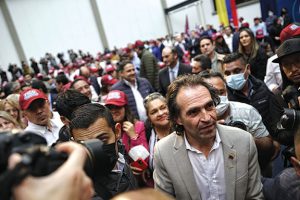Bloomberg
Preceded by a group of carnival drummers, Federico Gutierrez and his entourage progressed slowly into a working-class neighbourhood of Bogota, the pulse of the drums drowning out insults yelled by groups of
onlookers.
Gutierrez is running for Colombia’s presidency, and the capital’s grittier districts are the heartland of his main rival, Gustavo Petro. But the candidate known as “Fico†is betting that he can win over voters in areas like these by focusing on an issue that transcends class: street crime. “People are tired of being robbed, and of killings for a cell phone, a bicycle or a watch,†Gutierrez told the crowd in the north Bogota neighbourhood of Suba. “The most important thing is to guarantee security.â€
Colombia’s May 29 election is being closely watched after neighbour Peru and then Chile voted in unconventional leftist presidents within the past 12 months, showing how inequalities aggravated by the pandemic are shaking up Latin American politics.
Colombia, as home to the region’s third-biggest population and one of its fastest-growing economies, is the next gauge of voter appetite for disruption.
The country’s status as Washington’s strongest ally in the
region may also hinge on the outcome.
Petro, 62, a former mayor of Bogota, is the frontrunner on a platform that centers on a radical shift in Colombia’s economic model away from oil and coal. He also wants the rich to pay more tax, and plans to restore relations with the socialist government of Venezuela.
Yet Gutierrez, a 47-year-old civil engineer by training, is making inroads, including with his pledge to take a tough line on criminals of all kinds, from mafias to football hooligans. Polls show the election has narrowed to a two-horse race.
At stake is Colombia’s free market economic model, which would come “under stress†if Petro wins, said Jorge Restrepo, director of CERAC, a Bogota-based political research group.
Gutierrez wants to tweak the model, rather than overhaul it. Running for the “Team Colombia†coalition of conservative and Christian parties, his challenge is to avoid being tarnished as the continuity candidate at a time when the 50-million strong population is angry and demanding change.
While his support is growing, it’s unclear whether he can overcome the “huge†level of discontent directed at Colombia’s political class in general and the national government in particular, according to Restrepo. “He’s not the candidate to be a response to that,†he said.
Last year, the nation exploded in weeks of unrest over outgoing President Ivan Duque’s attempt to raise taxes. His government, which is akin to Gutierrez, remains deeply unpopular. Even though growth is forecast to outpace all other major economies in the region this year, soaring food prices have aggravated widespread hunger.
Gutierrez’s solution is to assert that while Colombia needs a lot of change — he advocates higher state payments to older people living in poverty, more paved roads in the countryside, more spending on nursery education — it can’t afford the “leap in the dark†that Petro represents. With the economy the No. 1 issue for voters, Gutierrez also tackled inflation, saying that surging food prices have made staples unaffordable for many and that companies should help by boosting wages now that the economy is recovering.
 The Gulf Time Newspaper One of the finest business newspapers in the UAE brought to you by our professional writers and editors.
The Gulf Time Newspaper One of the finest business newspapers in the UAE brought to you by our professional writers and editors.
